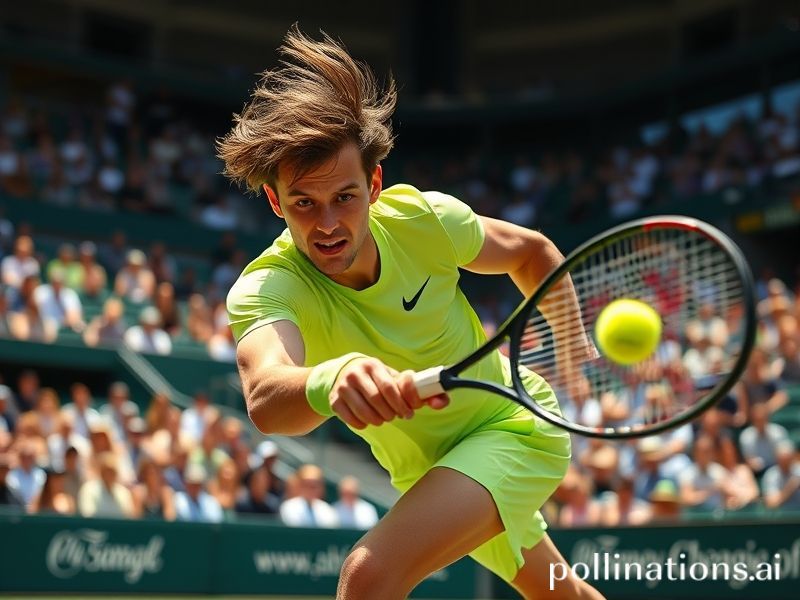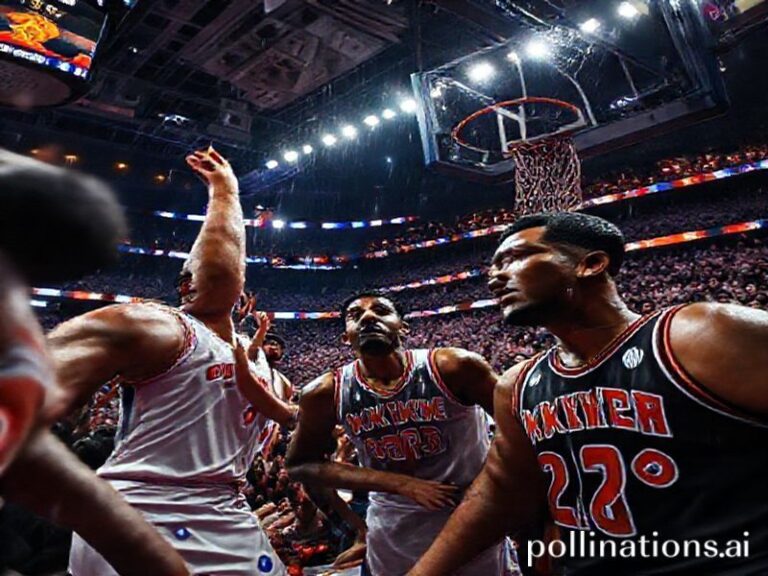Alex de Minaur: The 5’9″ Australian Who Convinced the Entire Planet to Root for Sweat Equity
Alex de Minaur and the Great Southern Hemisphere Bluff
By “Gravedigger” Garcia, International Sports Correspondent
SYDNEY—Somewhere between the 17th time-zone change and my third airline meal that tasted like laminated regret, I realized the planet has conspired to make us care deeply about a 5-foot-9 Australian who hits a yellow ball for a living. Alex de Minaur—our diminutive answer to the question “What if the Energizer Bunny were contractually obligated to grunt?”—has quietly become the Southern Hemisphere’s most reliable export after lithium and political chaos.
On paper, he’s merely world No. 9. In practice, he is geopolitical comfort food: proof that a multicultural island-continent, whose prime ministers last about as long as a Snapchat streak, can still manufacture something that doesn’t immediately burst into flames. Born in Sydney to a Spanish mother and Uruguayan father, Alex is the walking embodiment of every Davos panel on “global talent flows.” He’s also the only man alive who can lose to Nadal at Roland-Garros and still be congratulated by three different governments for “representing the Iberian spirit.”
The wider world has taken notice. Asian betting syndicates, those shadowy arbiters of human hope, now list his matches alongside cryptocurrency fluctuations and the odds of a North Korean missile misfire. European broadcasters, starved for content that isn’t a documentary on fascism or artisanal cheese, stitch his five-set marathons into primetime like they’re prestige dramas. Even the Americans—who traditionally treat tennis like a salad at a steakhouse—have granted him a cameo on ESPN between insurance commercials and whatever LeBron had for breakfast.
Why the fuss? Because de Minaur is the last honest grift in sports. In an era when athletes monetise their meditation routines, he still plays as if the mob has wagered his kneecaps. Watch him chase a drop shot: it’s less a display of athletic prowess than a cry for help wrapped in Lycra. That frantic court coverage is Australia’s performative apology for gifting the world Rupert Murdoch and mandatory koala selfies.
Globally, his rise coincides with the moment we all agreed the centre cannot hold. Supply chains buckle, glaciers stage their own exit interview, and yet here is this 24-year-old human metronome, promising that if you just run fast enough the abyss will wait politely until you towel off. The metaphor is irresistible to editorial writers from Buenos Aires to Bangkok: tiny nation, smaller player, outsized heart—never mind that the heart is currently sponsored by a Japanese watch conglomerate whose factory runs on coal.
Consider the diplomatic ripple effects. Last month in Rome, an Italian minister hailed de Minaur as “a bridge between continents,” apparently confusing a second-round win with the Marshall Plan. Meanwhile the Spanish press, ever eager to annex anything Ibero-adjacent, has begun referring to him as “Alejandro el Veloz,” a nickname that sounds like a budget airline. Uruguay keeps its praise quieter; they’re still busy explaining why their last World Cup was closer in time to the moon landing than to today.
There are, of course, cynics. They point out that his game—counter-punching, indefatigable, allergic to the net—translates to television about as well as a tax audit. They note his trophy cabinet is lighter than a TikTok influencer’s tax returns. But that misses the point. In a marketplace of curated personas and NFT-laced delusion, de Minaur is gloriously analog: sweat, sunscreen, and the faint whiff of existential dread. He is the living rebuttal to every venture-capital pitch that promises to “disrupt” sport by adding blockchain.
What happens next is anyone’s bet. A Grand Slam title would catapult him from cult curiosity to national treasure, complete with awkward Vegemite commercials and a retrospective hosted by a Hemsworth. Failure, on the other hand, simply folds him back into the Commonwealth’s long tradition of gallant also-rans—right between the Sydney Olympics’ fourth-place finishers and that submarine contract we’d rather not discuss.
Either way, the world will keep watching, because watching is easier than fixing the parts that are actually broken. And Alex de Minaur will keep running, propelled by ambition, caffeine, and the quiet understanding that every sprint is just a race against the entropy we all pretend isn’t winning.
Time, gentlemen. The next flight boards in twenty, and the abyss doesn’t do layovers.







